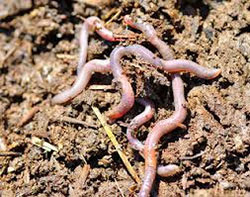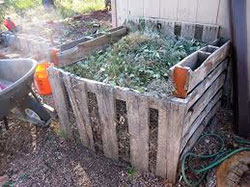The success of a gardener can depend on maintaining a healthy population of earthworms and microorganisms in the garden soil. How does the earthworm have such an effect on plant growth? Earthworms and microorganisms transform fertilizer nutrients from one form to another, making the nutrients available to plants. They digest dead plants and animals, turning them into organic matter, which stores and releases nutrients for plant growth. Earthworms also aerate the soil, which helps preserve an air-water balance important for plant growth.
dead plants and animals, turning them into organic matter, which stores and releases nutrients for plant growth. Earthworms also aerate the soil, which helps preserve an air-water balance important for plant growth.
How can a healthy soil be maintained? One way is to avoid the use of pesticides on a lawn except when necessary. These may kill earthworms and microorganisms in the soil as well as the disease organisms. Instead of routinely using a lawn pesticide, use one only when a problem arises and only after natural treatments have been considered. Treat problem spots, if possible, instead of treating the entire lawn.

Composting yard wastes and recycling organic matter back into soil supports beneficial microorganisms and earthworms. Add compost to annual flower and vegetable gardens, and recycle grass clippings into the lawn.
Add organic matter to the soil and adopt care practices that preserve soil health. You will be amply rewarded.
For more information, see the following Colorado State University Extension fact sheet(s).
- Organic Fertilizers
- Vegetable garden: Soil Management and Fertilization
- Choosing a Soil Amendment
- Composting Yard Waste
- Lawn Care
- Xeriscaping: Creative Landscaping



